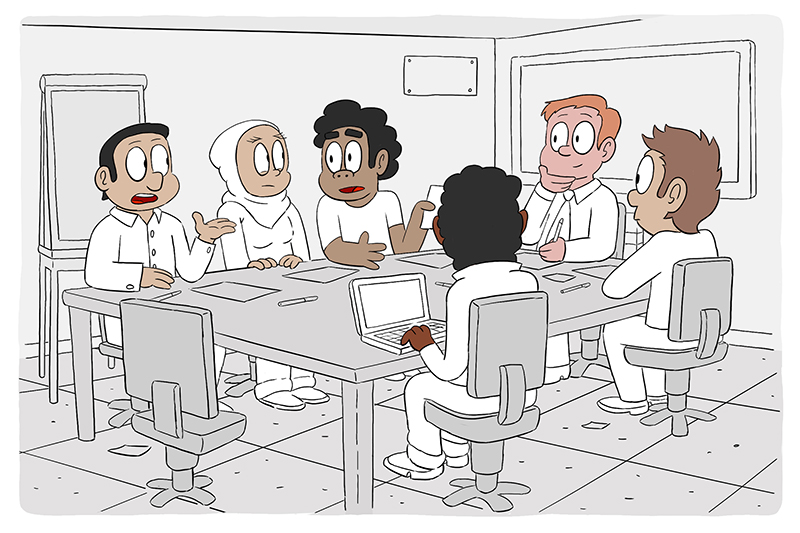
Hanan was invited to an internal meeting at the asylum center, along with the staff and a few other refugees. She did not expect an invitation, and learned that she got it because she is a woman and has experience as a restaurant manager in Syria. Hanan listens carefully to what is being said. The team leader, Hans Visser, opens the meeting and says they will first discuss handling incoming mail and emails. “How can we answer them faster?”
To Hanan’s surprise, one after another begins to talk, and the discussion goes on for a very long time. Sometimes the speakers interrupt each other. At one point, the team leader asks Hanan’s opinion. She doesn’t want to offend anyone and carefully tries to say what she thinks, although she doesn’t think it’s at all important to share it in this way. One of the staff members says that what she suggests is not possible, and again there is discussion in the group. Hanan is ashamed of her idea and confused about the turn of events. “What a chaotic meeting, why doesn’t the team leader just say how he wants it?”
Hans welcomes Hanan’s presence. He wants a good representation of all asylum seekers at the table. None of the women had come forward, so then we asked Hanan. He thinks she is a bit quiet, but of course it is also the first time. He will talk to her separately afterwards to hear how she thought it went. Hans is happy with the fruitful discussion, everyone contributes and we have many ideas on the table that we can move forward with.
The connection
Hanan’s experience is very typical. Many newcomers recognize her surprise. The meeting seem like chaos. Everyone is allowed and often wants to give their opinion! Everyone gets to pee on it. A proverb that does apply here. For most people in the Netherlands it is important that they can have their say before a joint decision is made. And also to hear all stakeholders. There can be fierce discussions with arguments and counterarguments.
The person running the meeting let it happen and even encouraged the discussion. He also wanted Hanan’s opinion. Which, by the way, was immediately rejected by a staff member. Very direct.
Holland’s egalitarian society makes a difference here, but so does individualism. The team leader helps start the discussion, but does not decide alone. Everyone gets to participate and wants to: individualistic.
And this is all enhanced by the search for consensus. The motivation is not your own success, but joint solutions. Preferably without winners and losers.
A great deal comes together in this story. It shows how complex intercultural communication is and that all the social dilemmas come into play all the time. Because we haven’t talked about avoiding that uncertainty. What can be uncomfortable for Hanan is not only the conversation to leadership and talking through each other, but also the lack of structure of the meeting.
Next time, Hanan might try to be more forthcoming. Maybe she can repeat her point of view again, or give another argument or reason why what she says does matter. She can also show when she agrees or disagrees with something, by nodding or shaking her head, for example.
And team leader Hans can pay better attention to ensuring that Hanan comes into her power by being alert to her body language and creating space for her. He does not have to say this explicitly, but he can take it into account through conversation techniques. The colleague’s immediate reaction has a big impact on Hanan. Hans does not want her to stay away next time because she is embarrassed. That is where he can intervene and show some leadership by giving Hanan a chance to explain more.
In short
For Hans:
- Accept that Hanan and other asylum seekers mostly come from a hierarchical and we society.
- The fact that everyone gives their opinions and sometimes talks interchangeably can be confusing.
- Be aware of the impact your way of communicating makes on your hearing. Even if you don’t say anything.
- Behind smiles and silence are many emotions. Be alert to body language.
For Hanan:
- Accept that the Netherlands has an egalitarian and I society.
- Everyone gets to participate and the boss does not make his own decision.
- What is said is more important than how it is said.
- Take advantage of the idea that the team leader and others are also accessible and you can express your own opinions.
Important to know:
This anecdote is based on stories shared with us. Connect2Us strives to highlight the dilemma from both sides and not to label people or suggest that one or the other should behave differently. We see in our daily intercultural work that awareness by those involved is enough to move toward each other without pretending to be very different. Connect2Us aims to help readers recognize and avoid prejudice. Read about prejudice, discrimination and racism here.

